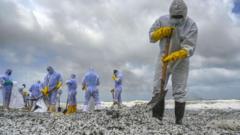Nguyen Thi Ngoc Diem, a victim of Agent Orange, reflects on her struggles as U.S. foreign aid decreases, questioning America's responsibility toward those affected by the chemical during the Vietnam War.
U.S. Abandons Commitment to Address Agent Orange Legacy in Vietnam

U.S. Abandons Commitment to Address Agent Orange Legacy in Vietnam
President Trump's funding cuts threaten the support for Agent Orange victims in Vietnam, highlighting the ongoing impact of the war.
Nguyen Thi Ngoc Diem, an Agent Orange victim residing in southern Vietnam, is among those profoundly affected by the toxic legacy of the Vietnam War. Even as she began to receive assistance from a U.S. A.I.D.-funded program that offered graphic design training, the recent cuts in foreign aid from the Trump administration have cast uncertainty over future support for her and others like her.
Diem, born with a malformed spine and misshapen limbs likely due to her father's exposure to Agent Orange, expressed her frustration at the lack of continued U.S. commitment. “Agent Orange came from the U.S. — it was used here, and that makes us victims,” she said. Despite her recent employment opportunities, the prospect of further assistance such as a new computer or small loan has been jeopardized.
Under Trump, many funding initiatives aimed at helping Agent Orange victims were frozen, alongside plans to reduce the workforce within U.S.A.I.D. The shift raises questions regarding the ethical obligations of the U.S. towards those still suffering from the consequences of its wartime actions. Diem's current situation, relying on outdated equipment from 2011, underscores the vital need for ongoing support and recognition of the historical impacts of the Vietnam War.
As the U.S. foreign aid landscape shifts, the future is uncertain for individuals like Diem who look to their past for aid and assistance in rebuilding their lives.























